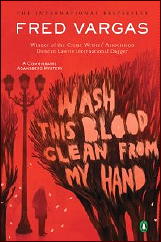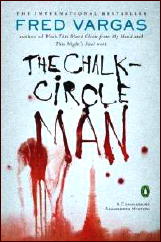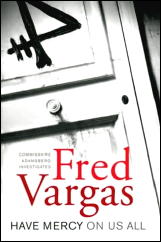Tue 2 Nov 2010
Reviewed by LJ Roberts: FRED VARGAS – Wash This Blood Clean from My Hand.
Posted by Steve under Bibliographies, Lists & Checklists , Characters , Reviews[4] Comments
Reviews by L. J. Roberts
FRED VARGAS – Wash This Blood Clean from My Hand. Knopf-Canada, hardcover, 2007. Penguin, US, trade paperback, 2007. First published as Sous les vents de Neptune, Paris : Viviane Hamy, 2004; translated by Sian Reynolds.
Genre: Police procedural. Leading character: Commisioner Adamsberg; 5th in series (4th translated into English). Setting: Canada.

First Sentence: Leaning his shoulder against the dark basement wall, Jean-Baptiste Adamsberg stood contemplating the enormous central heating boiler which had suddenly stopped working, two days before.
Comm. Jean-Baptiste Adamsberg and seven of his officers are getting ready for forensics training in Quebec, Canada. A few days before they are to leave, Adamsberg sees a news story about a murder where the victim received three stab wounds to the stomach and the accused has no memory of committing the crime.
A number of similar crimes, including one where Adamberg’s brother was accused, occurred 16 years ago. Adamsberg is certain the true killer is back, except that he attended the man’s funeral. Now in Canada, another murder occurs, but this time it appears Adamsberg is the killer.
The most important elements of a book, for me, are the characters. Vargas creates wonderful characters, although she does not provide as much background with each book as a reader coming into the middle of the series should have.
However, once you do start to know the players, they become real and characters about whom you want to know more. What is appealing about Adamsberg is that is he a very unconventional policeman, yet he gets results and has the loyalty of his colleagues and friends.
Vargas’s voice is wonderfully effective. Originally written in French, I appreciate that the translation still has a Gallic undertone to the text. Her descriptions are vivid and her phrasing lush. She has an excellent ear for dialogue, and a delightful sense of humor.
The plot of Wash This Blood is so well done. Yes, there are coincidences — it is rare to find a book without them — but it is also very clever with excellent twists and a soupçon of poignancy that adds dimension to Adamsberg’s character.
It is also the first time I recall that we see Adamsberg really lose his temper, which humanizes him even more. I’ve one criticism in that it feels as though there is a book missing from the series. Knowing how Have Mercy ended, this did cause a bit of confusion in terms of series plot continuity.
This was an excellent read. I highly recommend both it and the series which must be read in order — frustrating as the English versions have not been published in series order.
Rating: Excellent.
The Chief Inspector Adamsberg series —
1. The Chalk Circle Man (2009). First published in France as L’Homme aux cercles bleus (1991).

2. Seeking Whom He May Devour (2004). First published in France as L’Homme à l’envers (1999).
[*] The Four Rivers. Date? [Graphic novel]. Published in France as Les quatre fleuves (2000).
3. Have Mercy on Us All (2003). First published in France as Pars vite et reviens tard (2001).

[*] Coule la Seine (2002). [Collection of graphic stories.] Not yet published in English.
4. Wash This Blood Clean from My Hand (2007). First published in France as Sous les vents de Neptune (2004).
5. This Night’s Foul Work (2008). First published in France as Dans les bois éternels (2006).
6. An Uncertain Place (2011). First published in France as Un lieu incertain (2008).
Editorial Comment: Please consider this bibliography a work in progress. Dates for the French editions are based on information obtained from Wikipedia-France. Dates for the English editions are (I think) a mixture of US and Canadian first printings.
In any case, L.J. is correct in suggesting that readers of the series in the US have been treated badly by Ms. Vargas’s publishers. One can assume, however, that perhaps they started with what they believed to be a stronger title in the series, uncertain of the reception her books might receive.
Whether one must read the graphic novel or collection listed above (without number) in order not to miss any of the overall series continuity is at present unknown, but it would explain L.J.’s comment regarding “a book [she felt was] missing from the series.”
November 3rd, 2010 at 5:12 am
I beg to differ. Vargas certainly writes well and she’s never boring, but I found this particular book to be thin on actual plot, and stretching credulity to the last degree even to a fan of Fredric Brown and John Dickson Carr like me.
Having said that, I think Vargas is one of the best things that happened to French crime fiction in decades. Our local landscape had been dominated by political noir for years and Vargas in her own, muted way managed to bring the mystery and the fantasy back into the Gallic crime novel. Bless her for that.
November 3rd, 2010 at 5:24 pm
Sometimes coincidences in detective stories drive me crazy too — it sounds as though that’s what you’re referring to — and other times I simply have to accept them as unavoidable.
I suppose at that point it depends on how well you respond to the author’s style, the depth of her characters, and so on.
I’ve not yet read anything by Vargas, so I can’t comment further, but if I see this one in Borders the next time I stop by with discount coupon in hand, this may be the one I’ll use it on.
A question for you, Xavier. Have you read enough of Ms. Vargas’s work to respond to L.J. feeling that she’d missed something between books?
November 4th, 2010 at 2:22 pm
Steve,
My problem with the book was that the central premise required at least a Zeppelin for credulity to achieve some suspension – and remember I’m a lifelong JDC fan, not one to complain about improbabilities in my mysteries! Also, I thought the book was too long and too concerned with Adamsberg’s inner thoughts and private issues, but that’s a beef I have with most contemporary crime fiction so it would be unfair for me to hold it against Mme Vargas.
Regarding the “missing book”, I can’t answer this question since I haven’t read all of Mme Vargas’ books featuring Adamsberg, and those I did I read out of order (that’s why I object to series – they conflict with my messy reading habits)
Still, you really should read a Vargas if one falls under your hands; maybe not this particular one, but anything she writes is worth-reading.
November 9th, 2010 at 4:03 am
This sounds worth dipping into, though increasingly these days it is impossible to ‘dip into’ a series without reading three or four other books to fill in the background (a bit like comic books where you could never hope to catch up to the continuity if you tried to pick up series already in place).
Re the role of improbability and coincidence my rule is fairly flexible, but if I really notice enough to distract me from the books other qualities it goes down as a black mark. With Carr, and many others, I was willing to forgive a good deal because the coincidence or improbability didn’t distract from the fun, but if it gets in the way that’s a different matter.
Still, I agree with Xavier’s point about the political noir in recent French fiction, and if someone is bringing back a little of the fun it is welcome even if it comes attached to yet another introspective self absorbed European sleuth.
I really don’t mind the soap opera involving the protagonists private life save when it threatens to overwhelm the plot, or the book becomes about the heroes private life with detective incidents.
In recent years I’ve read a few where the heroes private life was so well realized I got to the end of the book not sure if the mystery had been solved or not — and in a few cases if there had even been one. Yet another bit of evidence that what makes for a good novel may not always make for a good mystery.
Some writers manage the blend expertly but increasingly there seems to be a tendency to favor the incidentals over what should be the main event in a mystery.